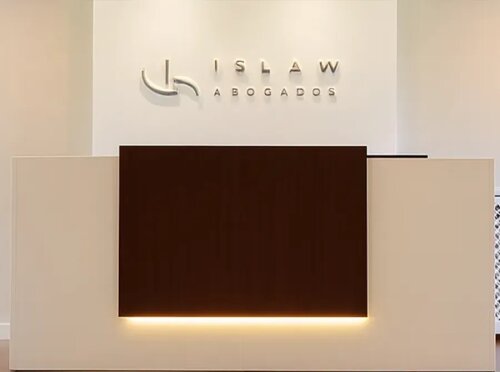Best Corporate Governance Lawyers in Dominican Republic
Share your needs with us, get contacted by law firms.
Free. Takes 2 min.
Or refine your search by selecting a city:
List of the best lawyers in Dominican Republic
About Corporate Governance Law in Dominican Republic
Corporate governance refers to the system of rules, practices, and processes by which companies are directed and controlled. In the Dominican Republic, corporate governance law establishes the framework for how companies operate, make decisions, and communicate with stakeholders. These regulations aim to ensure transparency, accountability, and fairness in the conduct of business, promoting trust among investors, shareholders, and the broader public. By having clear structures in place, companies can mitigate disputes, reduce risks, and enhance their reputation both locally and internationally.
Why You May Need a Lawyer
Navigating corporate governance laws is essential for companies and investors in the Dominican Republic. You may need a lawyer in several common scenarios, such as:
- Establishing a new company and drafting articles of incorporation
- Designing or revising bylaws and internal codes of conduct
- Ensuring compliance with local laws and international standards
- Managing shareholder meetings and resolving disputes
- Investigating potential conflicts of interest among directors
- Implementing anti-corruption and compliance programs
- Overseeing mergers, acquisitions, or restructuring processes
- Handling issues related to minority shareholder rights
- Managing director or officer liability
A specialized lawyer can help ensure that your business operates within the legal framework, reducing risks of penalties or disputes arising from governance issues.
Local Laws Overview
Corporate governance in the Dominican Republic is primarily governed by the Commercial Companies Law (Ley General de Sociedades Comerciales y Empresas Individuales de Responsabilidad Limitada, No. 479-08), as amended, along with related provisions in the Dominican Civil Code and relevant securities and tax regulations. Key aspects of local law include:
- Clear distinctions between types of companies, such as corporations (sociedades anónimas), limited liability companies (SRL), and simplified joint-stock companies (SAS)
- Requirements regarding the composition and functioning of boards of directors and managers
- Rules on fiduciary duties and responsibilities of company directors and officers
- Obligations for holding regular shareholder meetings and keeping transparent records
- Minority shareholder protections, including the right to information and recourse in case of abuse
- Mandatory external audits and disclosure obligations for certain types of companies
- Alignment with international anti-money laundering and anti-corruption standards
Understanding these laws is crucial for ensuring that your company maintains good standing and avoids liability.
Frequently Asked Questions
What is corporate governance and why is it important in the Dominican Republic?
Corporate governance refers to the system of rules and structures that guide how companies are managed and controlled. In the Dominican Republic, effective corporate governance protects shareholders, encourages investment, and fosters ethical business practices.
What are the most common types of companies in the Dominican Republic?
The main types include limited liability companies (SRL), corporations (sociedad anónima), and simplified joint-stock companies (SAS). Each has different requirements for governance and compliance.
Are there mandatory requirements for boards of directors?
Yes. Companies, especially sociedades anónimas, must have a board of directors with a minimum number of members and clearly stated roles and responsibilities. Board members must act in the best interests of the company.
What are the legal duties of directors under Dominican law?
Directors have fiduciary obligations, including the duty of loyalty and duty of care, and must act in good faith, avoid conflicts of interest, and ensure compliance with applicable laws.
How are shareholder rights protected?
The law provides for general and extraordinary shareholder meetings, voting rights, and access to company information. Minority shareholders have specific protections against abuse by majorities.
Is it necessary to have formal by-laws for a company?
Yes. The articles of incorporation and by-laws are fundamental documents that establish the governance structure, rules for decision-making, and procedures for resolving disputes.
What are the main compliance obligations for companies?
Obligations include maintaining accurate records, filing annual returns, conducting shareholder meetings, submitting to audits, and following anti-money laundering regulations.
Are there penalties for failing to comply with corporate governance laws?
Yes. Lack of compliance can result in administrative fines, legal actions by shareholders, or even dissolution of the company in severe cases.
How can corporate governance disputes be resolved?
Disputes can be resolved through internal mechanisms established in the by-laws, mediation, arbitration, or, if necessary, litigation before Dominican courts.
Do international companies face different governance requirements?
International companies operating in the Dominican Republic must comply with local laws, but may also have to meet additional standards set by their country of origin or international agreements.
Additional Resources
Individuals seeking information or assistance on corporate governance issues in the Dominican Republic may consider the following resources:
- Superintendencia de Valores (SIV) - regulatory authority for securities and capital markets
- Chamber of Commerce and Production (Cámara de Comercio y Producción) - resources and business registration support
- Instituto de Derecho de la Empresa (IDE) - academic and practical studies on business law
- Legal clinics offered by local law schools for SMEs
- Professional associations such as the Colegio de Abogados de la República Dominicana
- Technical guides and publications by multinational accounting and legal firms
These organizations can provide up-to-date regulations, best practices, and avenues for legal referrals.
Next Steps
If you require legal assistance with corporate governance in the Dominican Republic, start by gathering all relevant company documentation and identifying your specific concerns or objectives. Seek out a lawyer or law firm experienced in Dominican corporate law who can provide tailored advice. Scheduling a consultation with a qualified lawyer will help you understand your obligations, rights, and the best course of action for your company. Legal compliance in corporate governance is key to safeguarding your business and ensuring its growth and stability in the local market.
Lawzana helps you find the best lawyers and law firms in Dominican Republic through a curated and pre-screened list of qualified legal professionals. Our platform offers rankings and detailed profiles of attorneys and law firms, allowing you to compare based on practice areas, including Corporate Governance, experience, and client feedback.
Each profile includes a description of the firm's areas of practice, client reviews, team members and partners, year of establishment, spoken languages, office locations, contact information, social media presence, and any published articles or resources. Most firms on our platform speak English and are experienced in both local and international legal matters.
Get a quote from top-rated law firms in Dominican Republic — quickly, securely, and without unnecessary hassle.
Disclaimer:
The information provided on this page is for general informational purposes only and does not constitute legal advice. While we strive to ensure the accuracy and relevance of the content, legal information may change over time, and interpretations of the law can vary. You should always consult with a qualified legal professional for advice specific to your situation.
We disclaim all liability for actions taken or not taken based on the content of this page. If you believe any information is incorrect or outdated, please contact us, and we will review and update it where appropriate.
Browse corporate governance law firms by city in Dominican Republic
Refine your search by selecting a city.












